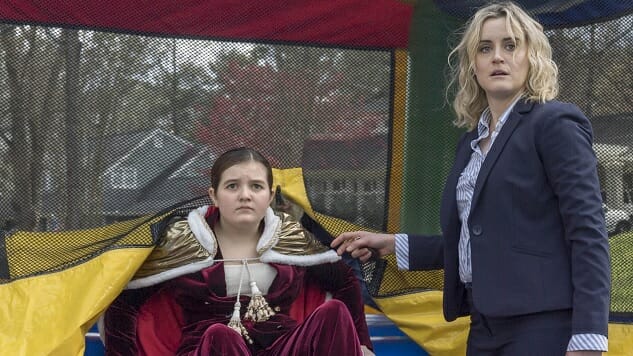
Being a Taylor Schilling character means existing in perpetual frazzled discontent (The Overnight, Orange is the New Black) or functioning as an uptight automaton subjugated by professional demands (Atlas Shrugged, Take Me). In Laura Steinel’s Family, Schilling has to straddle both lines while also missing a purpose, no matter how much her character, hedge fund manager Kate, argues otherwise. She’s a career woman who, having said “thank you, no” to social expectations a long time ago, has only her career, and tells herself that this, like the dog wreathed by flames in the Internet’s most relevant contemporary meme, is fine.
Family’s unsurprising thesis is that this is not, in fact, fine. Sticking with one of comedy’s most traditional blueprints—someone who thinks they have it all is taught by circumstances that they actually don’t—Kate’s brother (Eric Edelstein) and sister-in-law (Alison Tolman) call on her to babysit their daughter, her niece, Maddie (Bryn Vale), in a time of utmost need: Her folks need to move grandma into hospice, which means being away from home, which means she Maddie needs looking after.
How hard could it be? Other than Kate’s aversion to dust particles and germs invisible to the naked eye—she apparently inhabits a physical space that’s as hermetically sealed as her emotional space—and her lack of experience in wrangling teenagers, stepping in as Maddie’s temporary caretaker sounds like a piece of cake. Sure, Kate has an important pitch to important clients on the horizon; sure, she’s training the company’s newest hire, Erin (Jessie Enis), in the merciless art of being a professional woman in a man’s world; and sure, Maddie is a major weirdo, offense to weirdos not intended. If Kate can make bank for herself and her clients despite the smog cloud of loathing her coworkers cast about her, then feeding a high schooler and making sure they do their homework, go to ballet and attend school can’t be that difficult.
Au contraire: It is that difficult, in part thanks to the Insane Clown Posse. Kids kept at the outside edges of popularity by their peers’ cruel mockery wander those edges looking for like-minded social exiles with whom to make communion. Kate isn’t a monster. She sees and, as the office pariah, understands Maddie’s feelings of isolation. What she can’t understand is feeling so isolated that hanging out with kids and adults who slather their faces with grease paint, pound entire bottles of Faygo and listen to grown men wonder aloud how magnets work seems preferable to being lonely.
With Family, Steinel makes a tribute to aunties, the women in one’s life who dispense advice whether asked for or not, refuse to take guff and indulge their charges for the sheer joy of it. Rather than ballet, Maddie wants to do karate at the dojo next door, run by sensei Pete (Brian Tyree Henry). Kate lets her do karate. Maddie gets bullied at school, so Kate tells her to stand up to her bullies. Maddie roundhouse kicks one of them in the back of the head. (Appropriately, Kate and Pete are horrified but also totally proud at the same time.) Maddie wants to wear a suit to the prom instead of a dress, so Kate obliges. It’s harmless fun. (Maybe allowing chicken parm for dinner every night isn’t harmless, but still.)
But Family is also about character judgment. There’s some surprisingly compelling footage, played over the end credits, of real life Juggalos providing testimonials about what their community means to them, and in that a message about understanding the misunderstood. Asking audiences to give their understanding to ICP and legions of Juggalos is admittedly a big ask, but Steinel is only interested in Juggalos as far as they provide an extreme foil to offset the film’s roots in the mundane. (As misunderstood as you might think you are, in other words, there are always people out there who are moreso, though if it’s any consolation, they seem to prefer it that way.)
Pete gives the best description of and reaction to Family’s Juggalo delegates, a hilarious blow-off drenched in his disbelief at their ambivalent inscrutability. That’s for the best: He keeps viewers’ attentions on Schilling and her ability for mining humor and pathos out of the same exasperated gestures. Watching her rebel against the mercilessly ingrained principles of women’s workplace success—the idea that for women to run with the men they must necessarily be shut off from non-work activities, which sounds like a bum deal not worth taking—is a hoot. Kate refuses that deal. She finds satisfaction in letting her niece be the Karate Kid and hanging out with the weirdos. Family doesn’t make a Juggalo for life out of her, as it won’t most of its viewers, but that’s OK: By the end of the film, being Kate is better anyway.
Director: Laura Steinel
Writer: Laura Steinel
Starring: Taylor Schilling, Bryn Vale, Alison Tolman, Eric Edelstein, Brian Tyree Henry, Jessie Enis, Karan Kendrick
Release Date: April 19, 2019
Boston-based culture writer Andy Crump has been writing about film and television online since 2009 (and music since 2018). You can follow him on Twitter and find his collected writing at his personal blog. He is composed of roughly 65% craft beer.